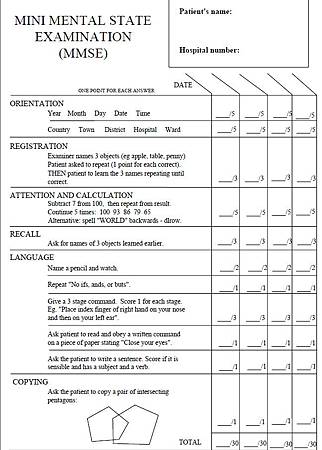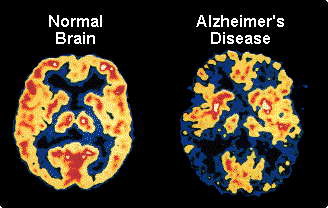►健康◄明日的記憶的一天*淺談失智症*
Q:失智症有那些症狀啊???
Q:The symptoms of dementia.
圖片來源:http://health.morningstar.com.tw/healthqa/sick_ans.asp?id=405
表現得很激動具攻擊性…
覺得自己的家被侵佔了…東西被偷了…
甚至覺得家人被藏起來了…或是懷疑另一半出軌…
憂鬱症而且常常睡不好…
而且因為睡不好分心而導致常常走失…
甚至有可能在公眾場合做出不雅的舉動…
(像是愛撫…手淫…或變身暴露狂…)
Agitation and aggression-Confusion or misunderstanding due to cognitive, language, or memory deficits.
Frightening, paranoid delusions-Common paranoid delusions include beliefs that the house has been invaded, that personal objects have been misplaced or stolen, that family members have been replaced by impostors (Capgras syndrome), or that spouses have been unfaithful.
Depression, Sleep disorders, Wandering(Distractibility and restlessness may lead to wandering.)
Sexually inappropriate behavior(Examples of sexually inappropriate behavior include inappropriate explicit sex talk and sex acts (grabbing, fondling, public masturbation, exposing). )
Q:到底甚麼是失智症???
Q:What is dementia?
圖片來源:http://tavis.tw/files/15-1000-11687,c1023-1.php
大家可能常常聽到阿茲海默症…
但失智症其實並不等於阿茲海默症…
確切來說阿茲海默症只是失智症其中的一個診斷…
而失智症主要是記憶及認知領域的喪失(失語症、失用症、失認症)…
而這方面功能的喪失足以影響到日常功能…
(所以像我平常會有點健忘的話那不算喔> ”< 我還會自己穿衣服啦)
失智症目前已經是個很常見的問題了…
主要常見於老年人…
(我老了如果走失要記得帶我回家~> <~)
Dementia is a disorder that is characterized by impairment of memory and at least one other cognitive domain (aphasia, apraxia, agnosia, executive function).
These must represent a decline from previous level of function and be severe enough to interfere with daily function and independence
And dementia is an increasing problem, primarily affecting elderly patients.
Alzheimer disease (AD) is the most common form of dementia in the elderly, accounting for 60 to 80 percent of cases.
Asymptomatic patients often present with concerns about developing dementia, especially when they have a family history.
(Only if you can’t handle with your own daily activities would be regarded as a dementia. For example, I may be forgetful sometimes but that doesn’t mean I ‘m a dementia cause I still know how to wear my clothes! But, if I should get lost when I‘m old, take me home please. )
Q:那麼要做哪些檢查才能得知並診斷自己得失智症呢???
Q:How to diagnose dementia?
圖片為:MMSE量表
(可以自己簡單做個測試)
當你有以上失智症狀開始出現覺得不對勁到醫院求治時…
或是你周遭有出現這樣症狀的人請立即帶他到醫院神經內科求治…
(不過我想如果你有以上症狀你大概也無法自己到醫院求治了= =)
當然詳細的檢查確立診斷是少不了的…
不過最常見的檢查就是簡易智能測驗…
醫師會用一個總分為30分的表格問你一些簡單的問題…
(但我想如果你已經失智的話這些問題對你來說並不簡單= =)
分數介在20~26分就是日常功能中度功能依賴…
可能有支配經濟方面的困難…
分數介在10~20分納在日常生活中依賴度又更高…
因為你可能沒辦法自己開車…購物跟維持自身清潔…
分數介在10分以下的就很嚴重了…
除了日常生活功能無法自理…還需要人看護照料…
The diagnosis of AD in practice depends on clinical criteria. The role of laboratory and imaging investigations is mainly to exclude other diagnoses. Neuropsychological testing may provide confirmatory information and aid in patient management.
Clinicians should also consider potential contributors to the dementia syndrome such as adverse effects of medication, depression, and metabolic disorders and deficiencies.
Clinical assessments — The clinical criteria are based on a history of insidious onset and progressive course, exclusion of other etiologies, and documentation of cognitive impairments in one or more domains. A detailed cognitive and general neurologic examination is paramount.
Many clinicians make use of standardized mental status scales, in particular, the Mini-Mental State Examination (MMSE), to document the presence and progression of dementia. It is important to use population-appropriate reference scores in the MMSE .
A MMSE score between 20 and 26 is associated with mild functional dependence, such as difficulty managing finances.
Moderate AD (MMSE score between 10 and 20) is associated with more immediate dependency, such as inability to drive, difficulty with hygiene and shopping, and remote memory impairment.
Severe disease (MMSE score under 10) correlates with a state of total dependence and need for constant supervision.
Q:為什麼我會得失智症???
Q:Why I became a dementia?
圖片來源:http://www.sfit.org.tw/health
而到底為啥米會得失智症…
至今似乎都沒有個確切的原因…
主要還是跟大腦退化有關係…
不過以下有幾項危險因子提供給大家參考…
像是年紀…家族病史…基因…輕度認知障礙…
若你有心血管方面的疾病…可能都是將來得失智症的危險群…
Dementia is a disorder of uncertain cause that primarily affects older adults.
The followings are high risks of demetia.
Age-remains the strongest risk factor for dementia, particularly for Alzheimer disease.
FAMILY HISTORY -Patients with a first-degree relative with dementia have a 10 to 30 percent increased risk of developing the disorder.
GENETIC FACTORS, MILD COGNITIVE IMPAIRMENT
ATHEROSCLEROSIS, Hypercholesterolemia, Hypertension, Smoking - Vascular risk factors have been linked to all incident dementia as well as to Alzheimer disease (AD) and vascular dementia individually.
Q:那失智症該怎麼處理治療呢???
Q: The treatments of dementia.
圖片來源:http://blog.sina.com.tw/tomorrow/
因為大腦的退化是不可逆的…
所以目前失智症臨床上只能就症狀方面去治療…
像是行為治療可以減少失智患者激動具攻擊性的行為…
確認會造成失智症患者激動具攻擊性行為的原因…預想並滿足他們的需求…
並盡量不要讓環境上有太大變動去刺激他們…
Nonpharmacologic management — Increasing evidence suggests that nonpharmacologic measures, including behavioral methods, may be effective in reducing agitation and anxiety in patients with dementia. Behavioral interventions employ different strategies and techniques.
These include identifying any preceding events that generate agitation, determining whether unmet needs can be anticipated and alleviated, and avoiding environmental triggers such as a sudden change in surroundings
抗精神藥物的使用則是針對失智症患者中有憂鬱症、失眠等精神疾病來使用的…
Antipsychotic drugs — Atypical neuroleptics have been the agents of choice for treating hallucinations in patients with dementia.
However, these drugs may increase mortality , and are not approved for the treatment of behavioral disorders in patients with dementia by the US Food and Drug Administration (FDA).
Nonetheless, their benefits often still outweigh their risks in patients with dementia when treatment of hallucinations and delusions is critical.
In the absence of other effective agents, we continue to use them cautiously, after informing the patients and families of the potential risks.
Antidepressants — Antidepressants have been studied in patients with dementia with regard to their effect on neuropsychiatric symptoms as well as depression.
其中最重要的還是主要照顧者的支持和陪伴…
但主要照顧者通常也是最需承受最大壓力的人…
尤其當失智症患者症狀變嚴重時…
因為他的身心就像回歸到小孩子那樣…
生活起居都必須有專人看護…
SUPPORT FOR CAREGIVERS — Caregivers of patients with dementia can suffer significant stress, particularly as cognitive function declines or behavioral symptoms worsen
Q:如何預防失智症???
Q: How to prevent dementia?
圖片來源:http://health.chinatimes.com/contents.aspx?cid=2,24&id=16054
就像之前提到過的…
至今仍無法確切的知道失智症的病因…
進而無法得知任何預防的方法…
只能從減少危險因子開始做起…
像是一些動脈血管硬化疾病也可能導致失智症…
所以就從健康飲食…規律運動做起吧…
有些文獻則指出增加維他命或魚油攝取可達到預防失智效果…
但至今都尚未有確切報告證實喔…
DIET-Low cholesterol and low fat diets, fruit, vegetables,and Omega-3 fatty acids
LIFESTYLE AND ACTIVITY-Accumulating evidence, mainly from longitudinal observational studies, suggests that higher levels of physical and mental activity as well as social interaction may help maintain cognitive function during aging. However, methodologic issues in observational trials make it difficult to be certain of the exact relationship between exercise, physical fitness, cognitive leisure activities, and dementia.
圖片來源:http://blog.sina.com.tw/tomorrow/









